|
|
|
Sort Order |
|
|
|
Items / Page
|
|
|
|
|
|
|
| Srl | Item |
| 1 |
ID:
180365
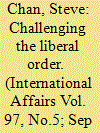

|
|
|
|
|
| Summary/Abstract |
Current discourse on International Relations conflates international order and the interstate distribution of power. Many studies fail to clarify the concept of international order or to provide systematic empirical analysis that compares states' conduct in relation to this order. The prevailing tendency relies instead on rhetorical assertion or definitional fiat to attribute revisionist and status-quo motivations to different countries. For example, power-transition theory claims that rising states are typically revisionist, whereas established states are committed to the status quo. This article presents a contrarian view, arguing that the dominant or established state can be a revisionist. This state is not forever committed to those rules and institutions of international order that it has played a decisive role in fostering. Conversely, a rising state is not inevitably bent on challenging the order that has enabled its ascendance. Revisionism is thus not unique to a rising power; moreover, this state is not destined to be a challenger to international order and an instigator of systemic war as typically depicted in the current literature. I advance these propositions in the context of recent conduct by China and the US, suggesting that whereas China has become less revisionist over time (even while its power has increased), the US has become more so especially during the Trump administration. The major impetus challenging the liberal international order has come more from domestic sources in the West than from China.
|
|
|
|
|
|
|
|
|
|
|
|
|
|
|
|
| 2 |
ID:
180362


|
|
|
| 3 |
ID:
180367
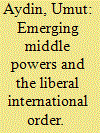

|
|
|
|
|
| Summary/Abstract |
In the post-Cold War era, a number of middle powers rose to prominence thanks to domestic reforms and a favourable international environment of economic and political globalization. These countries began to pursue middle power foreign policies, working actively in international organizations, engaging in areas such as conflict mediation, humanitarian assistance and the promotion of human rights, and helping to diffuse democracy and market reforms in their neighbourhoods. In this way, they contributed to the stability and expansion of the liberal international order in the post-Cold War period. Nonetheless, recent democratic and economic backsliding in these middle powers raises concerns. Focusing on the cases of Turkey and Mexico, this article explores how reversals in democratic and market reforms, exacerbated by recent trends towards deglobalization, influence emerging middle powers' foreign policies and their potential contributions to the liberal international order. I argue that whereas their rise had helped reinforce and expand the liberal international order, emerging middle powers' illiberal turn may have a destabilizing effect on this order.
|
|
|
|
|
|
|
|
|
|
|
|
|
|
|
|
| 4 |
ID:
180368


|
|
|
|
|
| Summary/Abstract |
Figures like Hungarian Prime Minister Viktor Orbán and former French National Front leader Marion Maréchal are seeking to establish what we call a new globalist illiberal order. The globalist illiberal agenda extends elements of the globalist project while reclaiming a radicalized view of Christian democracy. Europe's far-right views the global order as composed of strong nations who need to defend their sovereignty on ‘cultural’ issues while protecting their common Christian roots. We trace their project by focusing on two new institutions of higher education, Hungary's National University of Public Service Ludovika (Ludovika-UPS) and the Institut de sciences sociales, économiques et politiques (Institute of Social Sciences, Economics and Politics—ISSEP), based in France and Spain. Through these institutions, globalist illiberals aim to cultivate new leaders outside the liberal ‘mainstream’ and redefine the meaning of Christian democracy. We conclude that surging nationalism among mid- to small powers is not resulting in deglobalization but is fostering illiberal globalization, which has no place for those who do not fit in their exclusionary vision of Christian Europe.
|
|
|
|
|
|
|
|
|
|
|
|
|
|
|
|
| 5 |
ID:
180376
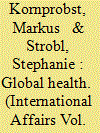

|
|
|
|
|
| Summary/Abstract |
Do global health institutions keep up with globalization forces? We contend that they seriously lag behind. While medical knowledge becomes more and more refined in showing how diseases spread globally, the political order meant to address this problem is barely global. It is global in terms of the promises it makes in declarations and even legally binding instruments (institutional foreground). But many entrenched political practices of interaction do not keep these promises (institutional background). We explain this with the dominance of a traditional diplomatic ‘feel of the game’ in which often narrowly defined national interests, positioning battles among states, and a subordination of global health under considerations of international security and economics prevail. Based on this diagnosis, we discuss three scenarios for the further evolution of the global health order: (1) the persistence of current institutions, (2) revisions of the institutional foreground and persistence of the background, and (3) a qualitative break that makes amendments to both. While the COVID-19 crisis provides openings for the third and, even more so, the second one, the current upheavals in the liberal constellation of orders makes the first scenario the most likely one.
|
|
|
|
|
|
|
|
|
|
|
|
|
|
|
|
| 6 |
ID:
180364
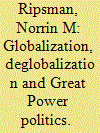

|
|
|
|
|
| Summary/Abstract |
Commercial liberalism would suggest that whereas globalization was conducive to great power cooperation—or at least moderated competition—deglobalization is likely to ignite greater competition amongst the Great Powers. In reality, however, the picture is much more complex. To begin with, the intense globalization of the 1990s and 2000s is not responsible for moderating Great Power tensions; instead, it is itself a product of the security situation resulting from the end of the Cold War. Furthermore, while globalization did serve to reinforce cooperation between the United States and rising challengers, such as China, which sought to harness the economic gains of globalization to accelerate their rise, it also created or intensified fault-lines that have led to heightening tensions between the Great Powers. Finally, while we are currently witnessing increasing tensions between the US and both China and Russia, deglobalization does not appear to be the primary cause. Thus, geoeconomic conditions do not drive security relations; instead, the geoeconomic environment, which is itself influenced by Great Power politics, is better understood as a medium of Great Power competition, which may affect the character of Great Power competition and its intensity, but does not determine it.
|
|
|
|
|
|
|
|
|
|
|
|
|
|
|
|
| 7 |
ID:
180372
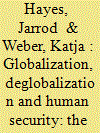

|
|
|
|
|
| Summary/Abstract |
Increased nationalism, greater protectionism and a gradual move away from a rules-based international order by some members of the international community do not bode well for vulnerable populations around the globe. Human security is threatened by a host of non-traditional security challenges catalysed by the growth of physical technologies and require multifaceted responses from a variety of actors. Many of those actors look to transnational networks built on globalized liberal order's social norms—what we call social technologies—for protection. The dwindling interconnectedness of deglobalization is likely to further empower corrupt governments at the expense of vulnerable citizens. This results from a decreased willingness by states and international institutions to defend human security. Whether one looks at the plight of persecuted citizens during Burma's military junta, human slaves in the fisheries off the coast of Indonesia, or farmers uprooted from their land by palm oil plantations, without social technologies to counterbalance the negative implications of physical technology the international community will lack the political capacity (sanctions, arms embargoes, travel restrictions, etc.), to aid those most in need. Ultimately, the effects of deglobalization on human security will depend largely on the trajectory of social technology developing alongside advances in physical technology.
|
|
|
|
|
|
|
|
|
|
|
|
|
|
|
|
| 8 |
ID:
180378
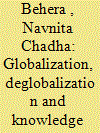

|
|
|
|
|
| Summary/Abstract |
Although globalization processes have brought the world closer through the exchange of knowledge, ideas and practices, advances in knowledge dissemination have not been mirrored by expansion in sites and modes of knowledge production. This article probes this disjuncture and asks how deglobalization might chart different pathways by delving into the intellectual history of the making of International Relations (IR). Focusing its gaze on the structuring principles of knowledge creation and modes of knowing rather than specific issues and problematiques of IR, it analyses the historical impact of western Enlightenment thinking through centuries-long imperialism, which continues to limit the agency of many states in the re-making of their life-worlds. The article describes deglobalization as a longue durée historical response that offers different possibilities for countering or challenging the discursive hegemony of the ‘West’. It discusses a ‘nationalist’ response by China—a rising power and a more dispersed, global academic endeavour seeking to decolonize IR's modes of knowledge production to better account for the diverse ground realities of its many worlds.
|
|
|
|
|
|
|
|
|
|
|
|
|
|
|
|
| 9 |
ID:
180379
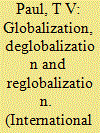

|
|
|
|
|
| Summary/Abstract |
Liberalism has been the most successful political ideology during the past two centuries in withstanding challenges and adapting to new environments. The liberal international order, set up after the Second World War and strengthened at the end of the Cold War, is going through a series of crises, propelled by deglobalization pressures, and the rise of illiberal and populist leaders, all challenging the three pillars of the liberal order: democracy, economic interdependence and international institutions. Two critical reasons for the decline of the liberal order are internal in terms of income distribution and institutional malaise. The article argues that the demise of the liberal order is not inevitable provided liberal states take remedial measures and adapt to the new environment as they did in 1919, 1930s, the second half of the 1940s, 1960s and 1991. Reformed globalization, or re-globalization is essential for facing the geopolitical challenges emanating from China and other illiberal states. The inability of other systems to offer both prosperity and freedom that the liberal order can provide is its main attractiveness. The connection between internal reforms in liberal states to address deepening inequalities and wealth distribution, a by-product of intensified globalization, and the prospects of liberal order's success is highlighted. The need for a refined welfare state taking into account the new realities to tackle the internal challenges is proposed.
|
|
|
|
|
|
|
|
|
|
|
|
|
|
|
|
| 10 |
ID:
180363
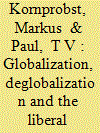

|
|
|
|
|
| Summary/Abstract |
For decades, globalization and the liberal international order evolved side by side. Recently, however, deglobalizing forces have been on the rise and the liberal international order has come to be increasingly beleaguered. The special issue ‘Deglobalization? The future of the liberal international order’ examines the interconnectedness of globalization and deglobalization processes on the one hand and the trajectory of the liberal international order on the other. This introduction provides a conceptual frame for the articles to follow. It discusses globalization and deglobalization processes, compares how they have been intertwined with the liberal international order in the past and presently, and explores how these differences are likely to affect the future of world politics. The special issue makes three important contributions. First, we examine globalization and deglobalization processes systematically. Second, we break new ground in studying the future of international order. Third, we generate novel insights into epochal change.
|
|
|
|
|
|
|
|
|
|
|
|
|
|
|
|
| 11 |
ID:
180377


|
|
|
|
|
| Summary/Abstract |
Since the Second World War, globalization has been underpinned by a liberal international order, a rules-based system structured around the principles of economic interdependence, democracy, human rights and multilateralism. However, the relationship between international mobility and the liberal international order (LIO) is contested. In the article, I disaggregate ‘international mobility’ into three regimes: the travel regime, the voluntary (labour) migration regime, and the refugee regime—each governed by distinct norms and operating procedures. I outline the characteristics of the LIO that pertain to international mobility and provide evidence to demonstrate that none of the three dimensions of international mobility—travel, migration, and asylum—reflects these characteristics. Given the LIO principles enumerated above, the exclusion of international mobility from the LIO is surprising. I survey the scholarship on the LIO and international mobility and argue that the exclusion of international mobility from the LIO rests on benefits provided to core states by the status quo ante governing international mobility. That is, the status quo ante permits countries of destination to determine the level and type of cross-border mobility. Thus, international mobility continues to be underpinned by the play of state preferences rather than the principles of the LIO. The COVID-19 pandemic is likely to shape these norms and operating procedures in ways that reinforce the status quo.
|
|
|
|
|
|
|
|
|
|
|
|
|
|
|
|
| 12 |
ID:
180374


|
|
|
|
|
| Summary/Abstract |
Economic globalization never proceeded in a smooth steady trajectory. The current international economy, organized around liberal principles, faces potential problems unleashed by the COVID-19 pandemic. Two popular theoretical approaches offer varying reasons for the survivability of the contemporary order. One stresses the benefits associated with participating in liberal international orders, claiming such arrangements are essentially self-sustaining. The rival view emphasizes the uneven distribution of gains, emphasizing the role of leadership, especially for dampening crises. To examine the support for each argument, I examine the evolution of international monetary arrangements. International monetary orders lie at the heart of liberal international economies; no prior liberal monetary order has proven self-sustaining. Liberal international monetary sub-orders depend upon leadership as much as cooperation for their survival—leaders exert efforts to shape followers' actions so long as the leader draws sufficient benefits to make such efforts worthwhile. The economic disruption caused by the COVID-19 pandemic provides the latest illustration of this point, though these arguments also suggest experiences across issue-areas will vary.
|
|
|
|
|
|
|
|
|
|
|
|
|
|
|
|
| 13 |
ID:
180366


|
|
|
|
|
| Summary/Abstract |
How did the attempt to make the world more liberal end up making the West less liberal? Following the end of the Cold War the US tried to promote liberalism in various parts of the world. This promotion took place under the liberal belief in its universality. A few of these attempts succeeded, most notably the integration of China into the global economy. Many other liberalizing endeavours failed, notably democracy-promotion in China, Russia and the Middle East. Yet, both the successes and the failures resulted in the rise of illiberal elements in the West as reflected in Brexit and Trumpism. The article shows how the outcomes of the attempts at liberalization—both the failures and the successes—generated these populist forces. The Chinese economic success took place at least partly because of the US-led integration of China into the international order. Yet, this success produced adverse economic effects in the West. Such outcomes led to the rise of economic populism. The American liberal interventions in the Middle East affected the rise of terrorism and of Muslim migration to the West. These developments influenced the rise of cultural populism in the West, which advances resentment of foreigners, migrants and minorities.
|
|
|
|
|
|
|
|
|
|
|
|
|
|
|
|
| 14 |
ID:
180371
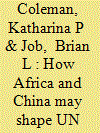

|
|
|
|
|
| Summary/Abstract |
UN peacekeeping became a flagship activity of the liberal international order (LIO) in the post-Cold War era, characterized by globalization, liberal norms and western leadership. Western states' diminished support for LIO UN peacekeeping has left it increasingly open to challenge, but significant changes are only likely if a strong group of states coalesces around an alternative model of UN peacekeeping. This article highlights African actors and China as well positioned to play pivotal roles in such a coalition. African states, who host the preponderance of UN missions and furnish almost half of the UN's uniformed peacekeepers, support globalized UN peacekeeping, show relatively weak support for the most liberal peacebuilding principles and assert the need for African-led solutions to continental crises. China's influence reflects its P5 status, financial and personnel contributions to UN peacekeeping and engagement with regional actors, notably in Africa. Aspiring to global leadership and a ‘new world order’, China endorses globalized UN peacekeeping but proposes a non-liberal (and non-western led) notion of ‘developmental peace’ to guide it. The complementarities between African and Chinese priorities raise the possibility of a profound challenge to LIO peacekeeping. Rather than heralding deglobalization, however, this challenge illustrates that post-LIO international institutions may instead be characterized by deliberalization and dewesternization.
|
|
|
|
|
|
|
|
|
|
|
|
|
|
|
|
| 15 |
ID:
180373


|
|
|
|
|
| Summary/Abstract |
There is much debate about the impending collapse of the liberal international order. It is provoked by the shifts in material and military capabilities from emerging peer and near-peer competitors, some of whom were not part of the original grand bargain and others that are in a stronger position to renegotiate the bargain. As one critical element of the liberal international order, we ask, during power shifts: is the liberal international trading order (LITO) durable and resilient? When and why will the LITO collapse? Does the relative decline of the hegemon alone explain these outcomes? In advancing a second-image reversed plus argument, we highlight how a shift in the nature of the foreign commercial orientation of peer and near-peer contenders can alter the domestic balance of power of two broad and logrolled coalitions competing to capture the state and thus affect whether the erstwhile leader defends, renegotiates, or abandons the trading order it created. To better understand these forces, we examine two paradigmatic cases: Britain in the 1930s and the United States in the 2000s.
|
|
|
|
|
|
|
|
|
|
|
|
|
|
|
|
| 16 |
ID:
180370


|
|
|
|
|
| Summary/Abstract |
This article proposes a complementary approach to analysing destabilization of the liberal international order (LIO) and argues that such challenges are related to endogenous institutional processes within the LIO. Faced with constraints of the core norms, rules and institutions of the LIO, states use interstitial organizations (INTOs)—new organizational forms recombining resources, rules, practices and structures from multiple institutional domains—allowing for innovative ways of delivering foreign policies. Using organization theory and new institutionalist approaches, the article outlines a three-dimensional analytical framework to the study of emergence of interstitial organizational forms and interstitial institutional change of international institutions. It applies this framework to the study of two types of INTOs—the European External Action Service (EEAS) and private military companies (PMCs)—both of which are shown to have transformational impacts on two core primary institutions of the modern state order, namely diplomacy and war. The article argues that reliance on INTOs can both enhance and constrain states' ability to promote the core principles of the LIO and concludes with a discussion of two possible paths of adaptation of this order.
|
|
|
|
|
|
|
|
|
|
|
|
|
|
|
|
| 17 |
ID:
180369


|
|
|
|
|
| Summary/Abstract |
If it continues, deglobalization may lead not to atomization but two overlapping international orders: a liberal one (LIO) led by the United States, and an authoritarian–capitalist one (ACIO) led by China. This equilibrium could emerge because a central purpose of international orders is to preserve the domestic regimes of their Great Power sponsors. The United States and China have markedly different domestic regimes, and so as China continues to grow in power and influence, tension over the content of international order should continue to grow. I borrow from Darwinian evolution the notion of ‘niche construction’: just as organisms alter phenotype selection by manipulating their natural environments, states can alter the ‘selection’ of domestic regimes by shaping their international environments. Modes of international niche construction include foreign regime promotion, interdependence, transnational interaction and multilateral institutions. The liberal democratic niche constructed by the United States and its allies after the Second World War preserved democracy for many decades. Today, China is attempting through various means to build a niche that will eliminate the liberal bias in international institutions and safeguard its own Market-Leninist regime. The resulting ACIO would select for autocracy and hence be partially separate from the LIO, which selects for liberal democracy.
|
|
|
|
|
|
|
|
|
|
|
|
|
|
|
|
| 18 |
ID:
180375
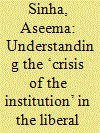

|
|
|
|
|
| Summary/Abstract |
The liberal trade order is in crisis. I argue that the origins of the current crises lie in the underlying tension which exists in the World Trade Organization (WTO), magnified by a churning in global power dynamics. A dilemma at the heart of the WTO between two important goals of representativeness and effectiveness means that both goals cannot be pursued at the same time. Now, this inherent tension is being magnified by power shifts in the global economy most evident in the rise of emerging powers within the WTO, who demand more representation, and the retreat by the US towards a more inward-looking orientation; both together damage effectiveness. Simultaneously, new powers such as China and India are defending a ‘reformed multilateralism’ combined with selective protectionism with varying capacity. These shifts are transforming previous ‘crises within institutions’ into a ‘crisis of institutions’ at the WTO, wherein the rules of the game, ideas of free trade and the legitimacy of the WTO are under threat. Global trade politics is seeing new coalitions at the WTO, as emerging powers craft their own rise, US defends sovereignty and trade protections, and launches a challenge to China's rise, and some established powers (the EU for example) seek to reform it. The new global trade politics is walking on two uneven legs and creating winners and losers and new ways of managing the transitional trading order as did the creation of the post-world war order.
|
|
|
|
|
|
|
|
|
|
|
|
|
|
|
|
|
|
|
|
|